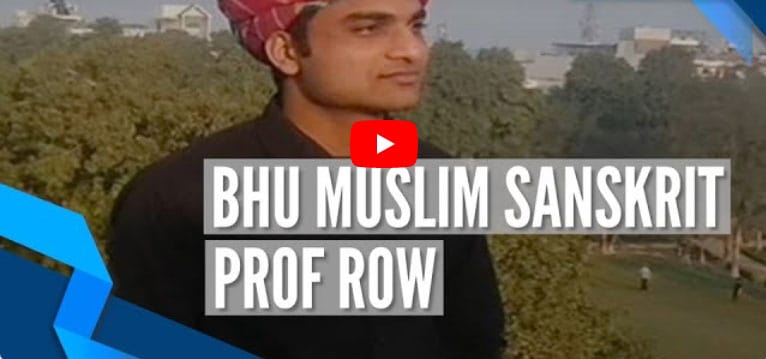Banaras Varanasi: Unable to bear the onslaught of communal politics in the BHU campus against him, Firoz Khan has quietly left Varanasi for his native place in Jaipur two days ago.
Firoz Khan has been in the eye of a storm following his appointment some time back as an assistant professor at Sanskrit Vidya Dharam Vigyan (SVDV) of BHU.

A large number of students of Banaras Hindu University went on strike protesting against Firoz Khan’s appointed in the literature department. They have been asserting that a non-Hindu (here meaning Muslim) cannot teach Sanskrit since it is the language of religion for Hindus.
The success of the strike has raised some grave questions on the changing colours of Indian politics. Does a language belong to a particular religion? For Firoz Khan it doesn’t, because he belongs to a family of Sanskrit scholars. As a child, Firoz Khan remembers his grandfather Gafur Khan in Rajasthan singing bhajans to swaying Hindu crowds. His father Ramzan Khan is a Sanskrit graduate. His younger brother has also studied Sanskrit.
But the students argued while sitting in protest: “A Muslim can’t teach us Sanskrit.” The agitation has continued despite that the administration making it clear that the selection committee had unanimously recommended the appointment of Khan “on the basis of prescribed UGC guidelines and BHU Act.”
According to the reports in the media, 10 candidates had been shortlisted for the post of Sanskrit professor. While Khan scored 10 out of 10, other applicants scored between 0 and 2.
Amazingly Varanasi is the same city which honoured Dr Mohammad Hanif Khan Shastri. There was yet another Muslim Sanskrit scholar from the same city who was given Padma award by the government.
Students who say that Khan’s appointment is a “conspiracy” and goes against the “sentiments” of Malviya, who helped set up BHU, claim that ‘the stone inscription installed in BHU states very clearly that no non-Hindu can either study or teach in our department. Then why was a Muslim professor appointed?” However, BHU management maintains that there is no such stone inscription on the campus.
The Vice Chancellor is firm on the fact that all rules and regulations had been strictly followed to select Dr Khan. According to the VC’s statement “The selection committee, chaired by vice-chancellor Rakesh Bhatnagar, had met on November 5 and recommended the most suitable candidate for the said position on the basis of the applicants’ performance in the interview.”
Dr Khan feels that teaching of Sanskrit has nothing to do with religion. He said he had been into Sanskrit learning since standard II and never faced any discrimination on the basis of religion.
Some academicians believe that the agitation against Khan’s appointment has been probably one of worst examples of the communalisation of the appointment of a Muslim teacher at BHU.
Khan completed his PhD from Rashtriya Sanskrit Sansthan last year where he also taught Sanskrit as a guest faculty. Khan has also cleared NET and JRF.
Firoz said that the excitement and the sense of pride over selection to BHU as assistant professor vanished following such a clamour over his appointment. He said religious credentials might come in the way as Sanskrit teacher had he been asked to teach the Vedas, Hindu scriptures, or Astrology (jyotish). But he would be teaching just Sanskrit literature which has nothing to do with religion.
The BJP’s students’ wing Akhil Bharatiya Vidyarthi Parishad (ABVP) is said to be behind to protest.
Lt General Bhopinder Singh (Retd) in his article writes, “Young Firoze Khan deserves better, and those who deny him that dignity in his own country, bring no glory to their cause, their religion, let alone the country.”


